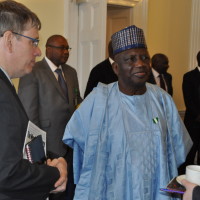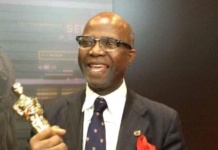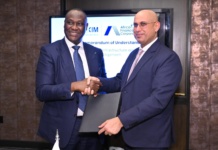In the spirit of a new democratic dispensation and a no nonsense government led by President Muhammadu Buhari, the Nigeria High Commissioner to the United Kingdom, Dr. Dalhatu Sarki Tafida delivered a tough speech at the Royal Institute of International Affairs, Chatham House on Thursday 9 July on Reflections on Nigeria – UK Relations.

Departing from the usual subtle diplomacy that is the hallmark of his over seven years of service as High Commissioner in the UK, Dr. Tafida touched on thorny issues that can improve the Nigeria – UK partnership.
Speaking to an audience in a room with policy makers from Foreign & Commonwealth Office, House of Commons and others, he said, at the moment Nigeria needs Britain to support the war against Boko Haram insurgency, but the UK, our supposed patron is still foot dragging in rendering support to Nigeria. Requests for military equipments, intelligence and training facilities have not been satisfactorily considered by the relevant UK Authorities. Nigeria was denied the purchase of bullet proof vests by the relevant UK authorities based on a rather flimsy and unfounded excuse of corruption, and human right abuses by the Nigerian Armed Forces.
Political Matters
Bi-national Commission is symbolic of efforts at deepening and widening relations between two countries. Unfortunately there appears to be some hesitation by UK authorities to have a Bi-National Commission (BNC) with Nigeria despite the fact that Nigeria has the same BNC with the United States of America, Canada, South Africa, Germany and Poland. We are at the verge of having the same framework of cooperation with Turkey and Russia. There is a draft BNC between Nigeria and the United Kingdom that created four great structures that would enhance the relationship between our two countries. These are namely: Power and energy, Economic relations, Political consultations and Education, Migration and Cultural matters. The last structure whose implementation is mutually beneficial for instance, would address such issues as capacity building and human capital development, opportunities for exchange of programs on information technology, fight against irregular migration, cultural diplomacy, prisoner transfer agreement and media exchanges.
Cultural difference
The High Commissioner expressed concern on the issue of Lesbian, Gay, Bisexual and Transsexual (LGBT). He said, ‘the current unfriendly position against Nigeria by the UK and its Non-Governmental Organisations regarding Nigeria’s human rights record. The NGOs have continued unabatedly to pressure Nigeria to abrogate our democratically enacted laws on Lesbian, Gay, Bisexual and Transsexual (LGBT). We in Nigeria see it as a cultural difference to the extent that we cannot impose polygamy, widely practised in Nigeria on the UK’.
Economic partnership
Trade and investment between Nigeria and the UK, has been characterized largely by export of oil and gas and few agricultural produce from Nigeria to the UK, with the latter exporting mainly manufactured goods to the former. The strict regulations in the UK as regards standardization, processing and packaging of agricultural produce and high tariffs have largely hindered export from the non-oil sectors in Nigeria to the UK.
Dr. Tafida expressed disappointment with the delay in concluding the Economic Partnership Agreement being negotiated at the level of the African Caribbean and Pacific (ACP) countries has not helped matters, due to the vacuum created by lack of harmonization of the trade laws among the member states, and in particular, the bilateral trade between Nigeria and the UK.
Deportation
The High Commissioner noted that Nigerians are not treated with dignity. He said, with millions of Nigerians living in Britain, the British attitude towards them has often been unreceptive with lack of sympathy especially during downturn in the economic situation in Britain. Foreigners (Nigerians included) are made scapegoats. They are accused of taking jobs from Britons, even though they principally do the jobs Britons refuse to do. They are also accused of exploiting Britain’s generous social security system. Those caught residing in the country illegally are subject to racial abuses and sometimes physical assaults as they are forcibly deported.









This is really interesting but I do not think cultural differences should affect relations as there is more important factors to focus on that really affect the lives of the masses. The support of freedom in sexuality is a controversial matter but I do not think it has a place in The political society at the moment when people are dying of starvation and thirst. I love this piece though; very interesting.
Comments are closed.